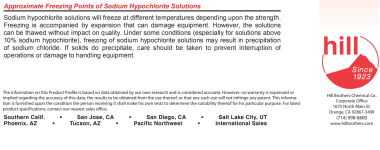I see the local forecast for this week is for a bunch of 3F - 4F mornings, and at least a few days with highs in the teens. So a reminder to those in the northeast... check your chemical storage!
I know 31% Muriatic won't freeze above -80F, but I think 10% Chlorine is only good down to +19F. Between ground sinking and solar gain, plus a little insulative factor of its own, it's likely my little closed storage box doesn't ever hit 19F most of the winter. But at 3F - 19F for two straight days, I suspect it likley will, so I'll be checking in there this afternoon to remember if there's any liquid chlorine left from last season... and move it indoors if there is.
Moreover, some of the other algicides and miscellaneous might not have well-published freezing points. Those will likely come indoors this week, as well. I hate storing chemicals in the garage long-term, but I don't mind doing it for the few coldest weeks of the winter.
I know 31% Muriatic won't freeze above -80F, but I think 10% Chlorine is only good down to +19F. Between ground sinking and solar gain, plus a little insulative factor of its own, it's likely my little closed storage box doesn't ever hit 19F most of the winter. But at 3F - 19F for two straight days, I suspect it likley will, so I'll be checking in there this afternoon to remember if there's any liquid chlorine left from last season... and move it indoors if there is.
Moreover, some of the other algicides and miscellaneous might not have well-published freezing points. Those will likely come indoors this week, as well. I hate storing chemicals in the garage long-term, but I don't mind doing it for the few coldest weeks of the winter.








